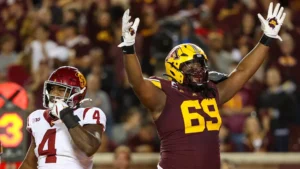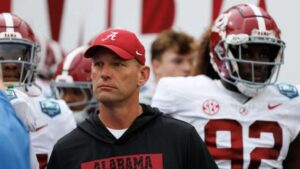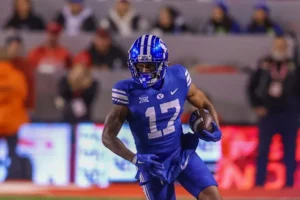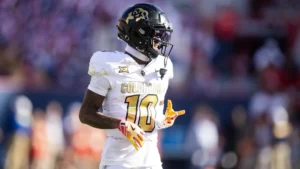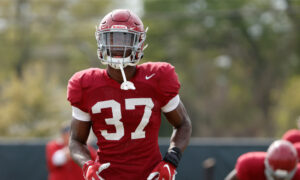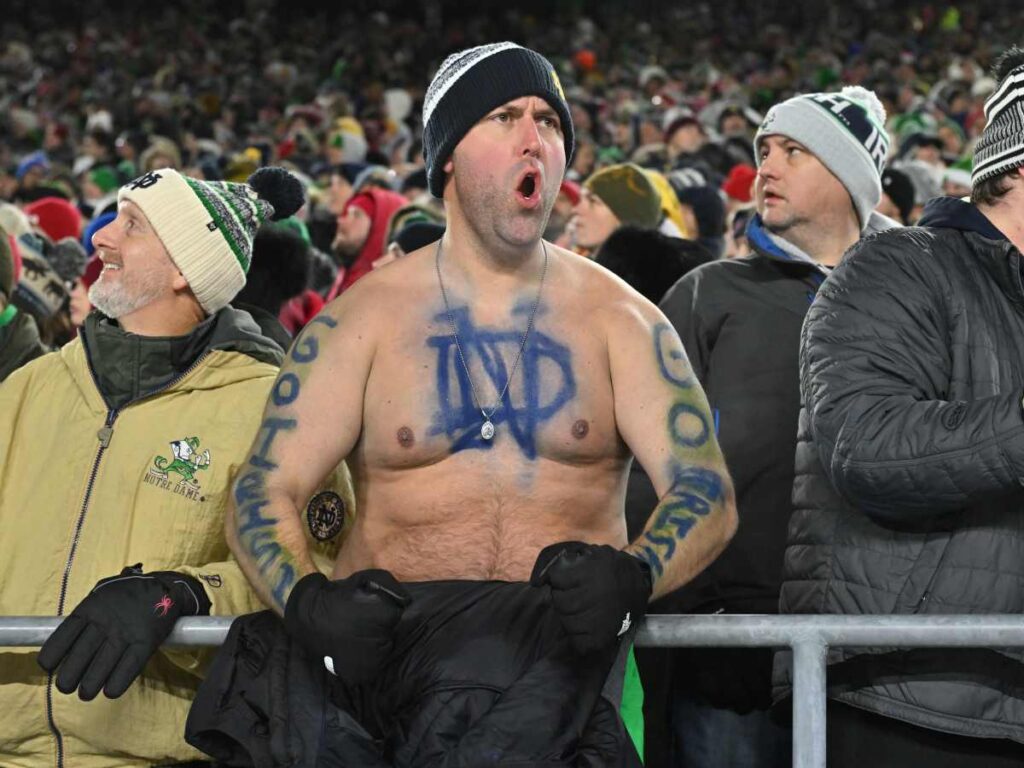
In a move that marks a significant shift in both the culture and business model of the University of Notre Dame, the administration has announced that it will begin selling alcohol at its football, basketball, and hockey games. This decision, made official in 2025, represents a pivotal moment in the history of the university, which is known for its rich traditions, religious values, and staunch commitment to upholding certain standards of conduct. The introduction of alcohol at these sporting events comes as part of a broader trend in collegiate athletics and is expected to have profound implications for the campus community, student body, and the larger landscape of college sports.
The Tradition of Notre Dame
Notre Dame, founded in 1842 by the Congregation of Holy Cross, is one of the most iconic universities in the United States, both academically and athletically. Known for its storied football program, its devoted alumni base, and its deep Catholic roots, the university has long upheld a sense of tradition that permeates almost every aspect of life on campus. From the fighting Irish mascot to the famous Golden Dome that adorns the university’s main building, Notre Dame has fostered a sense of reverence for its history and values.
In keeping with its Catholic identity, the university had previously maintained a stance on alcohol that was relatively conservative, particularly in relation to sporting events. Unlike many other major programs, alcohol sales were restricted at football games, with fans typically unable to purchase alcoholic beverages within the stadium. This policy aligned with Notre Dame’s desire to maintain a family-friendly environment and to promote values that reflect the university’s faith-based mission. But as the college sports landscape has evolved, with increasing emphasis on fan engagement and revenue generation, this long-standing policy has come under scrutiny.
The Changing Landscape of College Sports
The decision to sell alcohol at Notre Dame sporting events can be understood in the context of broader changes in college sports. In recent years, the landscape of collegiate athletics has undergone significant shifts, driven by changing demographics, the commercialization of sports, and the increasing desire to create a more engaging experience for fans. Many universities have recognized the importance of modernizing their fan experience, particularly when it comes to enhancing the atmosphere at major sporting events.
The trend of alcohol sales at college sports events has been on the rise across the country. Many schools, including some of Notre Dame’s athletic peers in the Power 5 conferences, have already embraced alcohol sales as a way to increase revenue and improve fan satisfaction. For example, the University of Michigan and the University of Wisconsin began selling alcohol at football games in the last decade, and several other schools followed suit. This change reflects the reality that alcohol sales at sporting events are not just a way to enhance the experience for fans but also a substantial revenue stream for athletic departments that rely heavily on game-day revenue to fund their programs.
The Business Case for Alcohol Sales
At a time when colleges and universities are grappling with increasing costs and a need for revenue diversification, the sale of alcohol at games provides a lucrative opportunity. The college sports industry is a multi-billion-dollar business, and programs like Notre Dame football bring in millions in revenue each year. However, rising costs of maintaining facilities, paying coaches, and supporting student-athletes have put pressure on athletic departments to find new sources of funding.
For Notre Dame, the financial considerations of selling alcohol are substantial. Notre Dame is a private university, and while its athletic programs are well-funded and generate significant revenue from television contracts, ticket sales, and donations, alcohol sales provide an additional layer of revenue that can help to support scholarships, facilities, and other initiatives. Alcohol sales are also an attractive option because they create a new revenue stream without requiring significant new investments in infrastructure. For example, the university has already made plans to introduce alcohol in designated areas within its stadium, basketball arenas, and hockey rinks, without requiring major changes to the venues themselves.
In addition to the financial benefits, the decision to sell alcohol may also help the university attract and retain fans. Alcohol is a social lubricant that often enhances the atmosphere of sporting events, particularly when it is integrated into tailgating traditions or made available throughout the game. With increasing competition from professional sports leagues and other entertainment options, creating a more vibrant and enjoyable game-day experience has become crucial to sustaining fan interest. Alcohol sales are a proven way to increase fan engagement, making the decision a logical one for the university.
Concerns and Controversies
Despite the clear financial and fan engagement benefits of alcohol sales, the decision has not been without controversy. For some, the move represents a departure from the university’s Catholic values. Historically, the Catholic Church has held conservative views on alcohol consumption, with a strong emphasis on moderation. For a university like Notre Dame, which prides itself on its faith-based mission and moral principles, the sale of alcohol at sporting events could be seen as inconsistent with the values it seeks to instill in its students.
Many alumni and supporters of the university have voiced concerns about the impact of alcohol on the family-friendly atmosphere that has long been associated with Notre Dame sporting events. The university has worked hard to create an environment that is safe, respectful, and inclusive, and some fear that the introduction of alcohol could erode these values, potentially leading to more disruptive behavior in the stands or an increase in incidents of alcohol-related misconduct.
Additionally, the potential for increased alcohol consumption could raise concerns about safety, particularly with large crowds in attendance. For many college campuses, alcohol-related incidents have been a significant issue, and some worry that the sale of alcohol at sporting events might encourage binge drinking or lead to more frequent instances of public intoxication. In response to these concerns, Notre Dame has implemented strict regulations and guidelines surrounding alcohol sales. For example, alcohol will be sold only in certain designated areas, and individuals will be limited in the amount they can purchase. Additionally, the university has committed to providing ample access to water and non-alcoholic beverages, as well as promoting responsible drinking.
There are also concerns about how alcohol sales will affect the atmosphere of the student section, which is often known for its rowdiness and enthusiasm. The addition of alcohol could change the dynamic, potentially making the atmosphere less family-friendly or increasing the likelihood of intoxicated behavior among students. In response, the university has emphasized its commitment to creating a safe and inclusive environment for all fans and has indicated that it will closely monitor the situation to ensure that the policy does not negatively impact the overall fan experience.
A New Era for Notre Dame Athletics
The decision to sell alcohol at Notre Dame football, basketball, and hockey games signals a new era for the university’s athletic programs. As college sports continue to evolve, so too must the ways in which institutions like Notre Dame engage with their fans and fund their programs. While the decision may raise some concerns, it also represents a broader cultural shift that is likely to shape the future of college athletics.
Notre Dame’s move to sell alcohol is not just a business decision—it is a reflection of the changing nature of college sports in the 21st century. As more schools embrace alcohol sales, Notre Dame is making a pragmatic choice in line with industry trends, while still striving to maintain the values that have made it one of the most respected universities in the country. The university will continue to face challenges as it navigates the tension between tradition and modernity, but its commitment to its mission and its community remains steadfast.
In the years to come, it will be interesting to observe how this decision impacts the fan experience at Notre Dame games, and whether it leads to positive or negative outcomes in terms of revenue, behavior, and the university’s broader reputation. What is certain, however, is that Notre Dame’s decision to sell alcohol at sporting events marks a pivotal moment in the institution’s history and will have a lasting impact on the way its athletic programs are experienced and celebrated.
